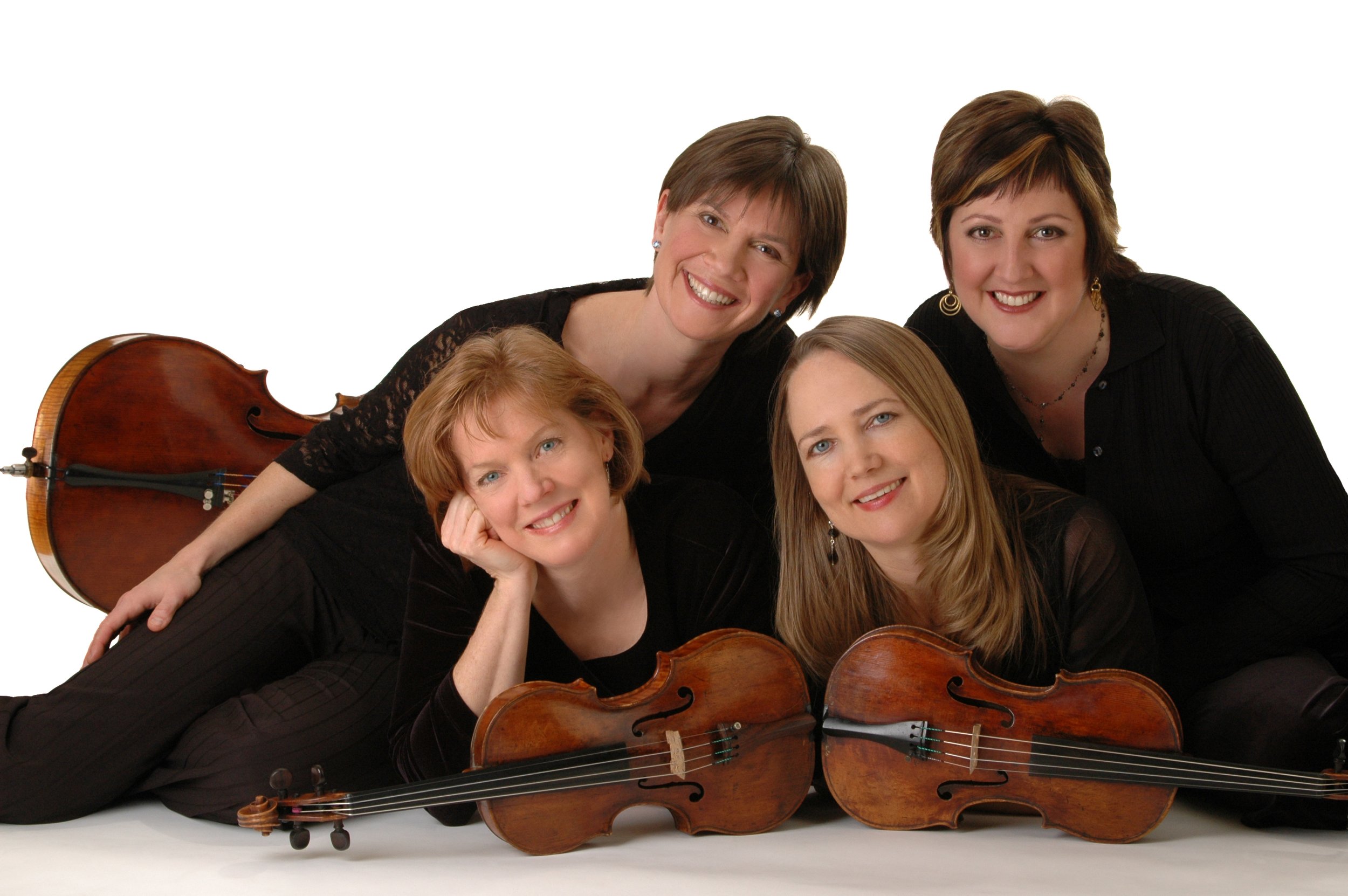Victoria's all-female Lafayette String Quartet plays a fond farewell tour
Before hanging up their bows, the highly attuned foursome hits PRISMA Festival
The PRISMA Festival presents the Lafayette String Quartet at Powell River’s Evergreen Theatre on Tuesday (June 13). For tickets and more information visit www.prismafestival.com.
COLD WAR POLITICS, clandestine rehearsals, jealous employers, eminent mentors, and the security of the tenured academic: there are any number of ways to approach the story of the Lafayette String Quartet, which this year celebrates 37 years of playing together without a single change of personnel. At its heart, though, this is a tale of friendship, as is obvious when violinists Ann Elliott-Goldschmid and Sharon Stanis join Stir for a Zoom interview.
The two musicians don’t exactly finish each other’s sentences; they’re too decorous for that, and too highly attuned to what the other is saying. But their conversation is often contrapuntal, as they merge anecdotal threads, share fond memories, and comment on or clarify specific points. It’s easy to hear why they—along with violist Joanna Hood and cellist Pamela Highbaugh Aloni—have been able to play together for so long; they know when to take the lead and when to share the spotlight, they listen attentively, and their mutual respect is readily apparent.
And that, remarkably, has been the case since before the beginning. The Lafayette String Quartet can trace its existence back to the fall of 1983, when Stanis, Hood, and Highbaugh Aloni were grad students at Indiana University, studying chamber-music performance with the esteemed Russian émigré Rostislav Dubinsky. Having been one of the founding members of the Borodin Quartet, along with fabled cellist Mstislav Rostropovich, he knew chamber-music talent when he heard it—and had a shocking proposal for his students.
“He said ‘Girls, do you mind playing with an old man?’” Stanis recalls, laughing. “He was younger than we are now!”
They did not mind, of course, and plunged into learning several works by Dubinsky’s friend Dmitri Shostakovich. Meanwhile, Elliott-Goldschmid was pursuing her own studies at Boston University. The four women finally met when auditioning, successfully, for a new, Detroit-based chamber orchestra, and boarding in the same university dorm.
“They came up to me in the washroom of the dormitory—I was brushing my teeth—and they said ‘Would you like to be in our string quartet?’” Elliott-Goldschmid says, visibly amused. “And I said ‘Sure. Why not?’”
It took a while for the Lafayettes to make that plan a reality. The orchestra’s leader didn’t want his players to pursue other projects, and getting together to practice involved a number of early-morning or late-night meetings behind closed doors. “Finally we decided to jump ship and resign,” says Elliott-Goldschmid. “Which is what we did.”
The four became the University of Victoria School of Music’s artists-in-residence in 1991 and have remained there ever since, through marriages, children, illness, and several well-received recordings. Now, though, their long run is ending. Wanting to spend more time with her husband and family, Stanis is retiring and moving back to her native Ohio—and after almost four decades, finding someone to take her place was not an option.
“My whole family lives in the Cleveland and Pennsylvania area, and my husband’s eight years older than me, and I feel really lucky that I’ve had these three colleagues and had the most rich, amazing career,” Stanis says. “If you’d told me I’d be playing Wigmore Hall and the Concertgebouw small hall and touring all over the world… It’s been an incredible run and for me, at least, I was ready to do the next chapter, moving back east and retiring.
“I even said ‘If you want to find a replacement, please do so,’” she adds. “But I don’t know if the three of you ever talked about that.”
“No,” says Elliott-Goldschmid decisively. “It’s the right time. It was the right time for all of us, and it was was very brave of you to be the first. I think all of us, in our hearts, knew that this was exactly the right thing.”
Before hanging up their bows, however, the members of the LSQ will make several farewell appearances, including a pair of gala performances in Victoria in August. Before that, the quartet will travel to Powell River to take part in the PRISMA Festival, a unique combination of summer music camp and concert series that aims to promote word peace through classical music. It’s a cause that both Stanis and Elliott-Goldschmid fully support, and they’re backing that up with a program that spans the full range of the Lafayette’s history and interests—from early classical music to a new commission from a female composer.
The four plan to open with Shostakovich’s Two Preludes and Fugues (No. 1 and 15), piano works arranged for strings by none other than their first mentor, Rostislav Dubinsky. “We recorded these on our first CD,” Elliott-Goldschmid notes. “They were a gift from Rostislav.”
Nicola LeFanu’s String Quartet No. 5 follows. It’s one of several works that the LSQ has recently commissioned as a kind of parting gift to the quartet world, and it will be featured on the group’s final CD, scheduled to be released later this summer.
“We were working on it today before talking to you, and we were saying that it’s like a mural,” Stanis says. “It unfolds. You hear things that come in and out, in and out, and you recognize these certain themes.”
“We feel it really deserves to be heard,” Elliott-Goldschmid adds. “It’s a very beautiful, powerfully beautiful work.”
“It’s evocative, it’s beautiful, and she’s quite the colourist,” Stanis concludes. “She’s very good at tone painting.”
For the last piece on the program, Wolfgang Amadeus Mozart’s String Quintet in G minor, the Lafayette players will include their “quartet husband”, Yariv Aloni, on second viola.
“He’s literally Pam’s husband, but he’s been a huge part of our lives, and we adore him,” Elliott-Goldschmid enthuses. “And this G-minor is perfect. There’s absolutely nothing in this quintet that we would change. It’s a powerfully emotional work, which Mozart composed shortly after the death of his father. It’s the result of Mozart’s deep longing for finding or making peace with his father, and it ends with one of the most joyful rondos you could ever imagine. It’s just so full of joy, even after this profound period of mourning.”
That the members of the Lafayette String Quartet are in mourning over the impending end of their long partnership is not in doubt. But that their bond will endure and find ongoing expression in other musical contexts is no less certain.














